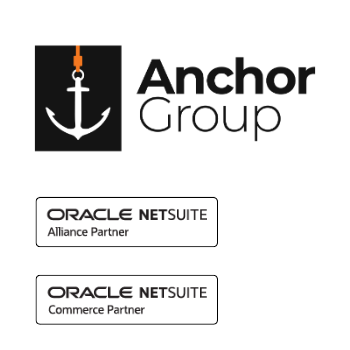
NetSuite ERP implementations are like brain surgery for your business. So, yes, there are risks with implementations.
Luckily, here at Anchor Group we’ve seen enough NetSuite implementations that we’ve got a pretty good idea of how to manage those risks. They say that an expert is someone who has made a lot of mistakes in a narrow zone; we’ve certainly made plenty of mistakes ourselves and observed many others making mistakes, too. As it turns out, most issues are resolvable; there aren’t many one-way doors.
What are the risks involved in a NetSuite Implementation?
NetSuite implementation-related risks come in four main flavors:
- Process risks
- Adoption risks
- Timeline risks
- Budget risks
Process Risks in a NetSuite Implementation
Examples of bad things from this category include:
- The software can’t do something that you assumed it could handle.
- The software forces you to change your process in some areas.
In the first case – the software doesn’t natively do something you previously assumed it could do – this is usually not a hard stop. It just turns into a budget and timeline conversation, as it indicates more work is required to get to the desired end state. There aren’t really any features that are truly impossible to add to NetSuite; there is just a spectrum of how easy, cheap, or advisable something is.
In the second case – the software forces you to change your process in some area – this is often not as bad as it seems at first. In the majority of cases, we find that NetSuite is already aligned with best practices, such that changing to match the structure of NetSuite will actually mature your business.
Still, it’s no fun to be surprised by process issues, so here is a mitigation technique: Don’t accept handwaving during the software sales process.
If complex revenue recognition is super important to your business, it isn’t enough for you to hear, “Oh, yeah, NetSuite handles revenue recognition already. No problem.” Trust but verify. Insist on being shown how it actually works in a demo account. Bring a knowledgeable process owner from your business to the demo so he or she can ask insightful questions.
The goal here isn’t so much to decide whether NetSuite is a good fit for your business; it’s mostly about figuring out how much tailoring of the new clothes will be necessary so you don’t get surprised later. Or, in some cases – like when NetSuite’s structure is better aligned with best practices than your current process – you might decide not to tailor the clothes and instead put your business through a workout regimen so that it fits the new clothes. Either way, you now know to expect tailoring costs or the effort of the body transformation.
Of course, you can’t dig deeply into every single process area and system capability during the sales cycle, so you will need to prioritize. How do you know which business processes are the most important, and so worthy of being highlighted during your sales calls with NetSuite and implementation scoping calls with consulting firms?
My recommendation: Build a high-level diagram of your existing business flows that touch your existing ERP (you will have some flows that don’t have much to do with the ERP system – you can ignore those for the purpose of this exercise).
Secondly, have a few experienced employees from different departments add their own insights to the diagram.
Finally, rank the various key activities according to their contribution to the main priority of the business (for instance, “revenue.”) The top 5-10 of those flows are good candidates to investigate early.
Adoption Risks in a NetSuite Implementation
Adoption risks concern issues with employee, customer, or vendor adoption of the new system.
I’ll give three recommendations to help avoid (well, reduce anyway) these sorts of people problems:
- Communicate about upcoming changes way more than you would think is necessary. Usually, by about the time you feel yourself growing hoarse from repeating the same message a billion times (“I’ve been talking about this change for months!”), a big section of your audience will have only just received the message for the first time (“Oh, are we switching to a new system? I hadn’t heard.”). It’s almost impossible to overdo this. Communicate however much you think you think is way too much and then double that.
- Incentivize early adopters of the new system. Discounts, rewards, prizes, etc. Once they’ve tried it once, it won’t be scary the second time.
- Make it culturally acceptable to feel dumb about the new system. Your employees are worried about their jobs in this time of transition. What to you feels like a fairly minor software change feels massive to them. They are also worried about looking stupid in front of others. The solution is to speak openly about those concerns and assure your employees that they are not expected to get things perfect on the first try or the second. Also, you will want to make training support easily available to them via both your NetSuite consultants and other tech-savvy super-users at your company.
If you do all three of those things you’ll be way ahead of most companies who are implementing NetSuite ERP.
Timeline Risks in a NetSuite Implementation
Anytime a NetSuite implementation doesn’t finish on the planned date, it is usually due to lax project management.
If individuals are not being held accountable to their commitments then the whole thing will fall apart. This is true for everyone involved, including your own employees, any consultants or NetSuite developers you’ve hired, any third-party software vendors, and NetSuite/Oracle staff.
Since there are several organizations involved in a NetSuite implementation, project management requires an extra level of leadership.
Our consultants provide that leadership. They take charge of not only Anchor Group's responsibilities but also managing the overall project, including wrangling all the other project managers. Since we’ve done this a few times before, it usually makes sense for us to be the top dog/head project owner / supreme czar of success.
Most of our new clients breathe a big sigh of relief when they hear that. It’s ok if you want to do that too. Feel better? Yeah, it’s nice to know you are in good hands.
Each organization needs its own project manager to coordinate with the overall project owner. That project manager needs to be empowered to move his or her organization to ensure deadlines are hit.

Where we’ve seen this fall apart most tragically is when the internal project manager at the business being implemented doesn’t have the influence necessary to get others at that business to cooperate.
So make sure your internal project manager for the implementation has the support of company leadership and the organizational sway to pull busy colleagues away from their regular jobs to complete necessary implementation tasks.
If there are any holdouts or resistant employees, especially in key roles, take them aside to have an alignment conversation about how awesome NetSuite will be for your company (and especially for those employee’s departments). Help them to see how a little extra work now will produce long-term benefits.
Budget Risks in a NetSuite Implementation
Project budgets get blown in two ways:
- Something costs more money to do than originally estimated.
- You decide you want to do something that wasn’t in the original project plan. Sometimes, this is a truly new idea, while other times, it is something that was assumed to be in the plan but not called out explicitly and, therefore, not budgeted for.
As far as the first budget issue goes, we recommend establishing a regular conversation to check in on the project budget relative to project progress. For our clients, we provide at least a monthly summary report, which includes budget tracking information. Near the end of an implementation, it often makes sense to check in on that more often, such as weekly.
To address the second budget issue, we have three main strategies:
- Practice tracer-bullet programming (I described it earlier on this same page as “sketching lightly with a pencil”) so you can review customizations throughout the build process, not just at the very end. These in-progress demos allow stakeholders to identify new additions to the plan much earlier in the project, which gives you more options and reaction time.
- Set clear priorities for the implementation. Face it – there will always be more ideas for fun features and improvements than budget to accomplish them.
- Recognize that a new feature might increase the cost relative to the original plan but might also increase the value relative to the original plan. That is, if the proposed new feature has good ROI – if it makes you more money than it costs – it’s silly to worry about the increased cost. The important thing is that you walk away with more money in the end. Don’t get fixated on the budget; instead, keep your focus on the ROI of the project.
NetSuite Implementation Support
Now that you've become familiar with some of the risks associated with a NetSuite Implementation and have learned about some of the mitigation techniques, hopefully, the whole process seems a little less daunting.
Another thing that can ease the weight of a NetSuite Implementation is to work with an experienced NetSuite Implementation partner who can guide you through the process! If you like what you read in this article and are interested in working with our team, contact us!
If you aren't sure what to look for in a NetSuite Partner, here's an article on How to Find the Right NetSuite Partner that my teammate Caleb wrote back in August of 2022!
Oracle NetSuite Alliance Partner & Commerce Partner
If you have general questions about NetSuite or more specific questions about how our team can support your business through your NetSuite Implementation, contact us! Anchor Group is a certified Oracle NetSuite Alliance Partner and Commerce Partner equipped to handle all kinds of NetSuite and SuiteCommerce projects, large or small.

